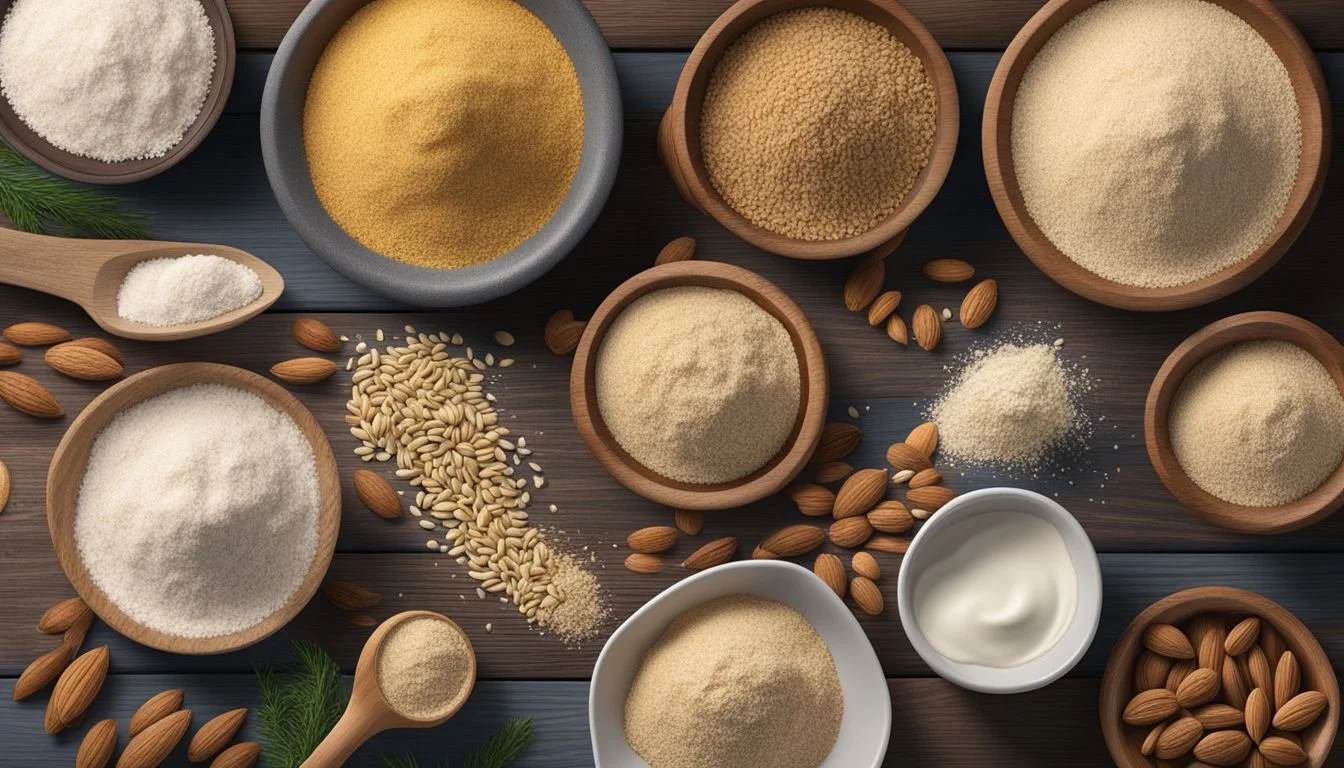Einkorn Flour Substitutes
Best Alternatives for Baking and Cooking
Einkorn flour, an ancient grain, has gained popularity due to its unique health benefits and lower gluten content compared to modern wheat. For those looking to substitute einkorn flour in recipes, several alternatives can work well depending on your specific needs. Whole wheat flour stands out as a high-fiber substitute, beneficial for digestive health and regulation of blood sugar levels.
Millet offers a gluten-free option with a similar nutritional profile to einkorn, making it suitable for those with gluten intolerances or celiac disease. Spelt flour, another ancient grain, also serves as a reliable alternative and is available in both whole and white varieties. Each of these substitutes maintains the wholesome qualities of einkorn while catering to different dietary requirements.
Choosing the right substitute involves understanding the unique properties of each flour type. Einkorn, for example, absorbs less water, so adjustments in liquid measurements are necessary when baking. This careful consideration ensures that the benefits of using ancient grains like einkorn and its substitutes are fully realized in any recipe.
Understanding Einkorn Flour
Einkorn flour, derived from an ancient wheat variety, holds a unique position among grains. It offers specific nutritional benefits and distinct characteristics that differentiate it from modern wheat.
Characteristics of Einkorn Wheat
Einkorn, one of the oldest cultivated grains, is known for its nutty flavor and high nutritional content. Unlike modern wheat, einkorn has a lower gluten content, making it easier to digest for some individuals with gluten sensitivities, although it is still not suitable for those with celiac disease.
The grain is rich in proteins, vitamins, and minerals such as iron, zinc, and magnesium. It also boasts a higher fiber content compared to modern whole wheat, contributing positively to the digestive system. Additionally, einkorn has a unique structure in its gluten that affects how it interacts in baking, making it absorb water differently and often requiring recipe adjustments.
Health Implications of Einkorn
Einkorn flour offers several nutritional benefits that modern wheat varieties lack. It has a lower glycemic index, which can help in maintaining stable blood sugar levels. Moreover, the grain provides a good amount of antioxidants, which combat oxidative stress in the body.
The presence of essential minerals like iron, zinc, and magnesium enhances overall health by supporting various bodily functions. Einkorn also contributes to a better digestive system due to its high fiber content. Although it contains gluten, the specific type might be less inflammatory for those with mild gluten sensitivities, making it a viable alternative for some individuals.
Substituting Einkorn Flour in Baking
When substituting einkorn flour in baking, it’s essential to consider the characteristics of the flour and how it interacts with different ingredients. Adjustments might be necessary to achieve the desired texture and density in your baked goods.
Flour Alternatives for Bread and Muffins
Einkorn absorbs water differently from other flours. For bread and muffins, spelt flour and whole wheat flour are excellent substitutes.
Spelt flour, with its protein content, provides a good structure for bread dough. It creates a similar crumb and texture to einkorn. Whole wheat flour offers a robust flavor and works well in muffins, giving them a hearty texture.
Spelt Flour: Use a 1:1 ratio as it has similar absorption properties.
Whole Wheat Flour: Increase hydration slightly to accommodate its denser texture.
Best Substitutes for Sweet Baked Goods
For cakes, cookies, and other sweet baked goods, consider all-purpose flour, buckwheat flour, and almond flour. All-purpose flour offers a neutral flavor that complements various sweet dishes. It provides a consistent texture, ideal for cookies and cakes.
Buckwheat flour, though denser, brings a nutty flavor that enhances sweet goods like pancakes and banana bread. Almond flour adds moisture and a tender crumb, making it perfect for pie crusts and gluten-free cookies.
All-Purpose Flour: Maintain the same quantity but adjust liquid content as needed.
Buckwheat Flour: Use in combination with all-purpose to balance density.
Almond Flour: Excellent for gluten-free recipes, use 1:1 ratio.
Adjustments for Texture and Density
Einkorn’s unique absorption properties mean adjustments are crucial to prevent baked goods from becoming too dense or dry. For dough recipes that involve yeast or sourdough, consider reducing the liquid by 20% and adding 1/4 teaspoon of ground ginger to improve rise.
For sweeter recipes, ensuring the right mix of flour and liquid is essential to avoid a crumbly or overly tough texture. Decreasing liquid by 1/4 cup for every cup of einkorn flour substituted helps maintain moisture levels.
For Bread: Reduce liquid by 20%, add a touch of ginger for better rise.
For Sweet Goods: Decrease liquid by 1/4 cup per cup of einkorn flour used.
Other Culinary Uses of Einkorn
Einkorn flour can transform various dishes by adding a unique, slightly nutty flavor and a pleasing, delicate texture. It can be particularly effective in pastas and pizza dough, as well as in specialty dishes such as soups and tortillas.
Pastas and Pizzas
Einkorn flour is an excellent choice for making homemade pasta. Its elastic nature provides the right balance of chewiness and tenderness. For pasta, use about 50% einkorn flour mixed with other flours to achieve a firm texture. The distinctive flavor of einkorn complements both simple and rich sauces.
When used in pizza dough, einkorn flour results in a light, crispy crust. To ensure proper dough consistency, reduce the liquid in your usual recipe by approximately 20%. This adjustment accounts for einkorn's lower liquid absorption. A pre-bake or par-bake of the crust is advisable to avoid a soggy base when heavier toppings are added.
Specialty Dishes
Einkorn flour also shines in specialty dishes such as soups and tortillas. For a hearty meat and einkorn soup, finely grind the einkorn to use as a thickening agent. This gives the soup a rich texture without the need for additional thickeners. Adding cooked einkorn grains to soups can provide a nutty flavor and additional nutrients.
In tortillas, einkorn flour yields a soft, pliable texture, ideal for wraps and tacos. Mix einkorn flour with water and a bit of fat to form a dough, then cook on a hot skillet until lightly browned. These tortillas pair well with both traditional and modern fillings due to their subtle, earthy flavor.
Choosing the Right Einkorn Flour Substitute
Selecting an appropriate substitute for Einkorn flour depends on dietary requirements, the desired texture, and nutritional benefits. Each alternative offers its own unique properties and advantages, catering to various preferences and needs.
Substitutes for Specific Dietary Needs
For those with gluten sensitivities or celiac disease, Millet flour and Buckwheat flour are excellent choices as both are naturally gluten-free. Additionally, Almond flour suits gluten-free diets and is also keto and Paleo-friendly due to its low carbohydrate content.
Amaranth flour and Rice flour are also solid options for gluten-free baking. Amaranth provides a mild flavor with high protein and fiber, while Rice flour offers neutrality in taste and a slightly gritty texture.
Substitutes for Texture and Baking Qualities
To emulate the texture and baking qualities of Einkorn flour, Spelt flour and Whole wheat flour are strong candidates. Spelt has a similar gluten structure but absorbs water differently, achieving a comparable texture.
All-purpose flour is versatile and commonly available in grocery stores. For those needing a more precise alternative, a combination of half All-purpose flour with half Buckwheat flour or Rice flour can yield better results. Almond flour provides a moist texture, perfect for dense cakes and cookies, but be mindful of its nutty flavor.
Nutrient-Dense Alternatives
Amaranth flour and Quinoa flour are nutrient-dense options, offering high levels of protein, fiber, and essential minerals. Both grains are also gluten-free, making them suitable for those with dietary restrictions.
Barley flour and Oat flour are other nutritious alternatives. Barley is fiber-rich and imparts a nutty flavor, while Oat flour provides a slightly sweet taste and is packed with vitamins and minerals. Buckwheat flour also stands out for its high protein and fiber content, making it a healthy choice for many recipes.
Practical Tips for Substituting Einkorn Flour
When substituting einkorn flour in recipes, consider conversion ratios, handling and storage techniques, and where to purchase it. These factors ensure a smooth transition and successful results in baking and cooking.
Conversion Ratios and Tips
Einkorn flour absorbs moisture differently. Substitute an extra 1/4 cup of einkorn flour for every cup of all-purpose flour.
For recipes requiring whole wheat flour, einkorn can usually be substituted one-to-one. Reduce liquid by about 15% to account for its slower absorption rate.
For gluten-free alternatives, millet flour is a good choice due to its similar nutritional profile.
Handling and Storage
Einkorn flour can spoil more easily. Store it in airtight containers in a cool, dry place. Refrigeration can extend its shelf life.
When grinding fresh einkorn wheat berries, use a grain mill for best results. Air-dry the berries before grinding to ensure proper texture.
Always sift homemade einkorn flour to remove any coarse particles and ensure a consistent texture in baked goods.
Purchasing and Availability
Einkorn flour is available at many health food stores and online retailers. Look for organic options to ensure the highest quality.
When buying in bulk, check for freshness and expiration dates. Some grocery stores may offer bulk bins for more budget-friendly options.
Exploring farmers' markets can also provide a source for fresh einkorn wheat berries if you're interested in grinding your flour.





